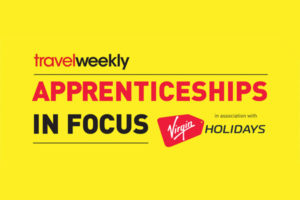In the second of a series focusing on a new approach to apprenticeships, Robin Searle looks at the practical implications for travel companies
The introduction of the new apprenticeship levy is now just over one month away – and while only a relatively small number of travel companies will pay into the fund, its introduction heralds a new start for how all companies approach apprenticeships.
From April 6, all companies who employ staff in the UK with an annual pay bill over £3 million will start paying the levy, with those wishing to utilise the levy on apprenticeships in England needing to register for an apprenticeship service account.
As apprenticeships are a devolved policy, Scotland, Wales and Northern Ireland will have separate approaches to delivering apprenticeship funding.
The apprenticeship service has already been trialled by hundreds of large employers across the country, including some from the travel industry, and is now open for registration.
Once set up, the service will allow companies to access funding for apprenticeships via their account, negotiate and pay for apprenticeship training and assessment, and stop or pause payments.
For those companies with lower wage bills who will not pay the levy, registration for the apprenticeship service is further down the line – with the government committing to having all business using the system by 2020.
However, that doesn’t mean that the changes to apprenticeships don’t affect these firms, as they will still be able to access funding for 90% – or in some cases 100% – of the cost of taking on and training an apprentice.
With the changes imminent, experts believe that many companies are only just coming to terms with how their business will need to adapt to implement the new approach.
Last month we looked at the latest information on the changes. Here we assess the key practical issues facing companies:
When do the changes kick in?
Many companies are already working with the National Apprenticeship Service to trial the new approach. In the travel and hospitality industry, companies have been working with People 1st to develop new apprenticeship standards and prepare for the introduction of the levy.
From April 6, companies with a pay bill above £3 million will be required to pay 0.5% of their annual wage bill via the levy. This will be paid monthly to HMRC through PAYE returns and, from May 1, all companies in England will be able to start using the new apprenticeship service to fund new apprentices’ training and assessment.
If we are a levy-paying company, how will we set up our account?
The government has announced the registration for the apprenticeship service is now open for all levy-paying companies. To register, companies will need their Government Gateway login details, Companies House number and details of their PAYE scheme.
We aren’t big enough to qualify for the levy, so can we ignore the changes?
While companies below the levy threshold won’t be required to register for the digital apprenticeship service until at least 2018, if they ignore the changes they could miss out on training and assessment funding for new apprentices. Any apprentices already working towards an apprenticeship at April 30 will continue to be funded on their current arrangement, but non-levy-paying companies taking on a new apprentice using approved programmes and providers from May 1 will be required to pay only 10% of the cost of training and assessment, with the government paying the remaining 90%. For new apprentices aged 16-18 or those aged 19-24 formerly in care or with a local authority education, health and care plan, the government contribution rises to 100%.
What can apprenticeship funding be spent on?
Funds in the apprenticeship service account and any co‑funding from the government can only be spent on the cost of apprenticeship training and assessment, and only via an approved training provider and approved assessment organisation. Funds will not be able to be used for costs such as wages, non-apprenticeship training schemes and the costs of setting up an apprenticeship programme.
How do you define an apprenticeship?
The government defines an apprenticeship as “a genuine job with an accompanying skills development programme”. The main rules are:
• The apprentice must be employedin a real job; they may be an existing employee or a new recruit
• The apprentice must work towards achieving an approved apprenticeship standard or apprenticeship framework
• The apprenticeship training must last at least 12 months
• The apprentice must spend at least 20% of their time on off‑the-job training – this training must be directly relevant to the apprenticeship framework or standard.
Who can provide the training and assessment?
Companies must use a provider listed on the register of apprenticeship training providers, with the Skills Funding Agency providing guidance on what criteria to look out for when selecting. Employers may apply to become training providers themselves, subject to approval, but many will use external providers. End assessments must be carried out by an independent organisation, and these will be listed on the register of apprenticeship assessment organisations.
Where can I go if I need more information?
• A helpline has been set up to help companies navigate the changes. The helpline can be reached seven days a week on nationalhelpdesk@ apprenticeships.gov.uk or on 0800 015 0600.
• People 1st has also produced a set of guidance notes which can be found at people1st.co.uk/apprenticeships.
This feature is the second in a year-long Travel Weekly series focusing on the subject of apprentices in the travel industry, run in association with headline partner Virgin Holidays.
The series, which is also being backed by Abta, the GTMC and People 1st, will include features on the impact of the new apprenticeship structure on the travel industry, and will highlight companies and individuals as they adapt their businesses and develop potential leaders of the future.
